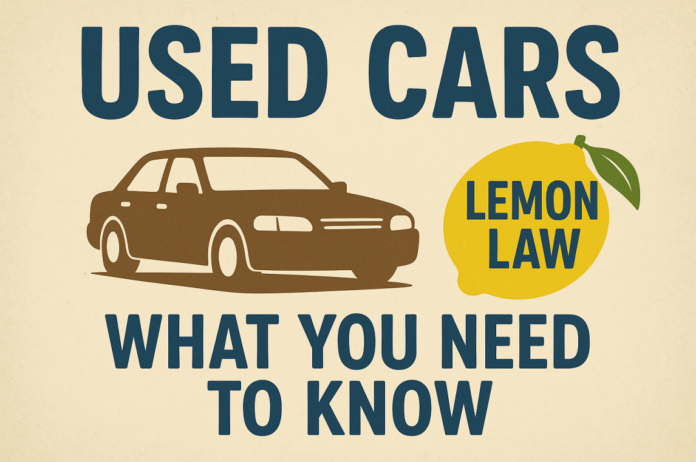When most people hear the term “Lemon Law,” they immediately think of brand-new vehicles that break down shortly after being driven off the lot. While that is a common scenario, California’s Lemon Law actually provides protections for certain used vehicles as well. Understanding how the law applies to pre-owned vehicles can help consumers make more informed decisions and know their rights if problems arise.
California Lemon Law Overview
California’s Lemon Law, officially known as the Song-Beverly Consumer Warranty Act, is designed to protect consumers who purchase or lease vehicles that turn out to be defective. If a vehicle has a substantial defect that impairs its use, value, or safety—and if the manufacturer or its authorized repair facility cannot fix the issue after a reasonable number of repair attempts—the consumer may be entitled to a replacement, a refund, or other remedies.
But how does this apply to used cars?
Used Cars Can Qualify—Under Specific Conditions
The good news is that used vehicles can be covered by California’s Lemon Law—but only under specific circumstances. The key factor is whether the vehicle is still covered by a manufacturer’s original warranty or a certified pre-owned (CPO) warranty at the time of purchase or lease.
The Lemon Law does not apply to every used vehicle on the market. If you purchase a car “as-is” without any existing factory warranty, your legal protections may be much more limited. However, if your used vehicle is still within the terms of the original manufacturer’s warranty—or if it was sold with a CPO warranty provided by the manufacturer—it may be eligible for Lemon Law protection.
Important Criteria for Used Vehicle Lemon Law Claims
To qualify under the Lemon Law, the following general conditions usually need to be met:
- The vehicle has a substantial defect that impairs its use, value, or safety.
- The issue originated during the warranty period (even if repairs continued afterward).
- The dealership or manufacturer has had a reasonable number of attempts to repair the issue.
- The vehicle has spent a significant amount of time in the repair shop—typically 30 days or more (cumulatively) within a certain time frame.
Documentation is crucial in these cases. Always keep copies of repair orders, warranty information, purchase agreements, and any communications with the dealership or manufacturer.
Does the Lemon Law Apply to Private Sales?
Generally, no. Private-party sales are not covered by the California Lemon Law unless the vehicle is still under a transferable manufacturer’s warranty. This is why it’s important to review the warranty status before buying a used vehicle from an individual seller.
What About “Buy-Here, Pay-Here” Dealerships?
Many consumers purchase used cars from independent dealers offering in-house financing, commonly referred to as “buy-here, pay-here” lots. These dealerships often sell vehicles without factory warranties. Unless they offer a specific warranty or service contract that meets Lemon Law criteria, these sales typically fall outside the scope of California’s Lemon Law protections.
That said, other consumer protection laws—such as those addressing fraud or breach of contract—may still apply in some cases, depending on the circumstances.
Why Warranty Type Matters
When buying a used car, ask about the type of warranty provided. A CPO (Certified Pre-Owned) warranty backed by the manufacturer is usually a sign of a higher-quality vehicle and is more likely to make the vehicle eligible under Lemon Law if something goes wrong. Warranties from third-party providers often do not qualify.
It’s also a good idea to run a Vehicle History Report, check for manufacturer recalls, and obtain a pre-purchase inspection from a trusted mechanic.
Getting Help for a Lemon Law Claim
If you believe your used vehicle qualifies as a lemon, it’s important to act promptly. The longer you wait, the harder it can become to gather evidence and pursue a claim effectively.
While many consumers try to handle Lemon Law claims on their own, working with a knowledgeable lemon law lawyer in California can make the process smoother. These attorneys understand the nuances of state law, how to deal with manufacturers, and what documentation is needed to support your case.
If you’re located in a high-volume car market like Southern California, consulting an Orange County lemon law lawyer may give you the regional experience necessary to navigate dealership disputes and court procedures effectively.
Wrap up
California’s Lemon Law offers powerful protections for consumers, including those who buy used vehicles—but only under the right conditions. If you’re purchasing a used car, always check the warranty status and keep detailed records of any problems and repairs. Knowing your rights can help you avoid long-term frustration and financial loss if you end up with a defective vehicle.
